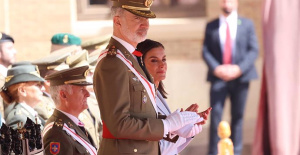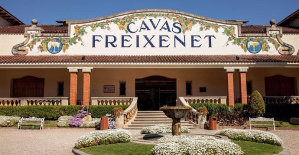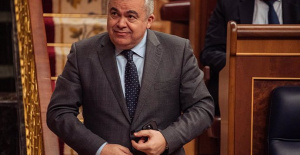The fighting leaves at least 12 dead and 87 wounded while the prime minister of unity breaks contacts with the parallel government
The capital of Libya, Tripoli, has become since this past dawn the scene of one of the most intense clashes in recent weeks between forces related to the unity government led by the Prime Minister, Mohamed Hamid Dbeibé, and militias associated with the government parallel to Fazi Bashaga in the east of the country, who would be leading an advance towards the city after denouncing for months the authorities of the capital as illegitimate, according to local sources.
Such is the seriousness of the situation that it is not ruled out that Dbeibé will soon declare a state of "general mobilization" in the country, according to Al Arabiya, while the president of the Transitional Presidential Council, the body recognized by the United Nations to manage the process in Libya, Mohamed Menfi, has been forced to bring forward the end of his official visit to Tunisia to return to the country urgently.
The fighting in Tripoli is pitting the so-called Support and Stability Force, under the orders of the unity government, against militias led by Haitem Tajouri, and has so far left at least 12 dead and 87 wounded, according to the latest balance published by the Ministry of Health of the Government of National Unity and collected by the Libyan news portal Panorama.
The mayor of the city, Ibrahim Al Shibl, has denounced a "tragic" situation in several neighborhoods -- especially in Bab Ben Ghashir, Jamhouria, Zawiya and Nasir, epicenters of the fighting this morning -- while the Ambulance and Emergency Service of Libya has called for a truce to open safe corridors in the capital.
In a statement collected by the Libya Observer portal, the Government of National Unity has deplored all the fighting and confirmed the "failure of the peace talks" with the parallel government of Bashaga after accusing the latter of "opting for violence".
Similarly, the Libyan unity government has warned of the appearance of "military concentrations" from the coastal highway to the east of Tripoli "to destabilize the security of the city, in a miserable attempt to widen the circle of aggression against the capital ".
Sources from the Libya Observer have specified that it would be militias related to Bashaga that have advanced from the Warshafana region and are now engaged in new combats against forces of the unity government in Janzour, in the west of the city.
In contrast, Bashaga's office has claimed that Dbeibé has ignored all attempts to reach a reconciliation. "For six months, Prime Minister Bashagha has welcomed local and international initiatives to resolve the crisis by peaceful transition of power."
The first international reaction has come from the spokesman for the United Nations Secretary-General, Stephane Dujarric, who has stated that the Security Council is observing "with concern" the events in Libya, including the mobilization of forces and the threats of resorting to confrontation violence in Tripoli for political purposes, and has called for immediate action to end the violence.
Next, the US, UK and the Netherlands have raised concerns about the fighting in Tripoli. From the North American Embassy the "deep concern" of the White House has been transferred. "We support the Libyan people in their call for peaceful dialogue," he said in a statement.
Similarly, the British Embassy issued a brief statement via Twitter calling for "an immediate end to the violence in Tripoli" and condemning "any attempt to seize or maintain power by force."
Meanwhile, Dutch ambassador Dolf Hogewoning has urged all parties to "refrain from violent acts" and called for "peaceful measures and dialogue for the benefit of all Libyans."
It should be remembered that Bashaga has attempted to take control of Tripoli as many as twice -- on July 22, clashes left 16 dead and around 50 wounded -- before giving up to avoid a serious armed struggle. Right now his government is based in the city of Sirte, but the prime minister of the east of the country has been threatening for days to carry out a definitive offensive against the capital.
Dbeibé came to power after the historic 2020 ceasefire that ended a year of fighting between forces from Tripoli and from the east of the country, led by rebel marshal Khalifa Haftar.
The transitional government was mandated to take the country to elections last December, but they never took place due to divisions over the rules and the presence of controversial candidates, culminating in the controversial appointment of Bashaga.

 Exploring Cardano: Inner Workings and Advantages of this Cryptocurrency
Exploring Cardano: Inner Workings and Advantages of this Cryptocurrency Seville.- Economy.- Innova.- STSA inaugurates its new painting and sealing hangar in San Pablo, for 18 million
Seville.- Economy.- Innova.- STSA inaugurates its new painting and sealing hangar in San Pablo, for 18 million Innova.- More than 300 volunteers join the Andalucía Compromiso Digital network in one month to facilitate access to ICT
Innova.- More than 300 volunteers join the Andalucía Compromiso Digital network in one month to facilitate access to ICT Innova.-AMP.- Ayesa acquires 51% of Sadiel, which will create new technological engineering products and expand markets
Innova.-AMP.- Ayesa acquires 51% of Sadiel, which will create new technological engineering products and expand markets Felipe VI swears the flag again 40 years later at the AGM with Princess Leonor as a witness
Felipe VI swears the flag again 40 years later at the AGM with Princess Leonor as a witness Freixenet and unions agree to reduce working hours by 20-50% this year due to the drought
Freixenet and unions agree to reduce working hours by 20-50% this year due to the drought STATEMENT: Nearly 400 people participate in the II Family Support Conference at UIC Barcelona
STATEMENT: Nearly 400 people participate in the II Family Support Conference at UIC Barcelona Cerdán censures the "dirty war" of the right and calls for a debate around "democratic regeneration"
Cerdán censures the "dirty war" of the right and calls for a debate around "democratic regeneration" How Blockchain in being used to shape the future
How Blockchain in being used to shape the future Not just BTC and ETH: Here Are Some More Interesting Coins Worth Focusing on
Not just BTC and ETH: Here Are Some More Interesting Coins Worth Focusing on A sensor system obtains the fingerprint of essential oils and detects if they have been adulterated
A sensor system obtains the fingerprint of essential oils and detects if they have been adulterated Faraday UPV presents the 'Origin' rocket to exceed 10 km of flight: "It is the beginning of the journey to space"
Faraday UPV presents the 'Origin' rocket to exceed 10 km of flight: "It is the beginning of the journey to space" The Generalitat calls for aid worth 4 million to promote innovation projects in municipalities
The Generalitat calls for aid worth 4 million to promote innovation projects in municipalities UPV students design an app that helps improve the ventilation of homes in the face of high temperatures
UPV students design an app that helps improve the ventilation of homes in the face of high temperatures A million people demonstrate in France against Macron's pension reform
A million people demonstrate in France against Macron's pension reform Russia launches several missiles against "critical infrastructure" in the city of Zaporizhia
Russia launches several missiles against "critical infrastructure" in the city of Zaporizhia A "procession" remembers the dead of the Calabria shipwreck as bodies continue to wash up on the shore
A "procession" remembers the dead of the Calabria shipwreck as bodies continue to wash up on the shore Prison sentences handed down for three prominent Hong Kong pro-democracy activists
Prison sentences handed down for three prominent Hong Kong pro-democracy activists ETH continues to leave trading platforms, Ethereum balance on exchanges lowest in 3 years
ETH continues to leave trading platforms, Ethereum balance on exchanges lowest in 3 years Investors invest $450 million in Consensys, Ethereum incubator now valued at $7 billion
Investors invest $450 million in Consensys, Ethereum incubator now valued at $7 billion Alchemy Integrates Ethereum L2 Product Starknet to Enhance Web3 Scalability at a Price 100x Lower Than L1 Fees
Alchemy Integrates Ethereum L2 Product Starknet to Enhance Web3 Scalability at a Price 100x Lower Than L1 Fees Mining Report: Bitcoin's Electricity Consumption Declines by 25% in Q1 2022
Mining Report: Bitcoin's Electricity Consumption Declines by 25% in Q1 2022 Oil-to-Bitcoin Mining Firm Crusoe Energy Systems Raised $505 Million
Oil-to-Bitcoin Mining Firm Crusoe Energy Systems Raised $505 Million Microbt reveals the latest Bitcoin mining rigs -- Machines produce up to 126 TH/s with custom 5nm chip design
Microbt reveals the latest Bitcoin mining rigs -- Machines produce up to 126 TH/s with custom 5nm chip design Bitcoin's Mining Difficulty Hits a Lifetime High, With More Than 90% of BTC Supply Issued
Bitcoin's Mining Difficulty Hits a Lifetime High, With More Than 90% of BTC Supply Issued The Biggest Movers are Near, EOS, and RUNE during Friday's Selloff
The Biggest Movers are Near, EOS, and RUNE during Friday's Selloff Global Markets Spooked by a Hawkish Fed and Covid, Stocks and Crypto Gain After Musk Buys Twitter
Global Markets Spooked by a Hawkish Fed and Covid, Stocks and Crypto Gain After Musk Buys Twitter Bitso to offset carbon emissions from the Trading Platform's ERC20, ETH, and BTC Transactions
Bitso to offset carbon emissions from the Trading Platform's ERC20, ETH, and BTC Transactions Draftkings Announces 2022 College Hoops NFT Selection for March Madness
Draftkings Announces 2022 College Hoops NFT Selection for March Madness




























